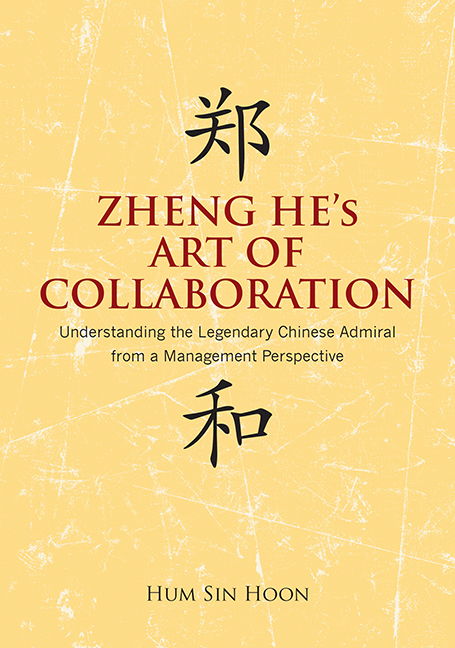 Zheng He's Art of Collaboration
Zheng He's Art of Collaboration An Alternative Model to Sun Zi's Art of War (AoW)
from PART I - ZHENG HE AND HIS MESSAGE
Published online by Cambridge University Press: 21 October 2015
INTRODUCTION
Much has been written on the grand voyages of Admiral Zheng He from the historical, diplomatic, cultural and maritime perspectives. We have therefore come to understand and appreciate Zheng He's body of work and contributions along these dimensions. Yet clearly, in planning, organizing, directing and controlling these voyages through uncharted geographic waters in the early fifteenth century, Zheng He demonstrated much capability in the realm of management and leadership that can be translated for the benefit of today's managers and leaders. However, little has been written from this management perspective about Zheng He.
In this chapter, we draw from existing literature to provide a version of what we refer to as Zheng He's Art of Collaboration (AoC). We present this as Zheng He's alternative to the Art of War (AoW) of Sun Zi.
Because much has been written on Sun Zi's AoW, today's managers and leaders have come to learn from this Chinese classic by viewing business as warfare. One of Sun Zi's most popular strategies is “If you know the enemy and know yourself, you need not fear the result of a hundred battles”. It can be deduced from this quote that one should approach doing business like fighting a war, and that one should treat competitors like enemies.
While this can be helpful, we present here an alternative model in Zheng He's AoC that can perhaps be even more relevant in today's world. In the recent years, more emphasis has been placed on creating peace and stability in the world. For instance, in 2009, U.S. President Barack Obama was awarded the Nobel Peace Prize for “his extraordinary efforts to strengthen international diplomacy and co-operation between peoples”. This captured the attention of many who recognize that adopting a peaceful approach towards collaboration is a more sustainable solution than aggression, antagonism and colonization.
This notion of creating peace and stability to benefit mankind is manifested in Zheng He's grand voyages. We have sketched out some of Zheng He's practices and apparent strategies, and have categorized them into the 4Cs — Capability-building, Coordination, Communication and Continuity. Together, these 4C strategies demonstrate Zheng He's Art of building the much needed Collaboration for the benefit of governments, businesses and the man on the street.
To save this book to your Kindle, first ensure no-reply@cambridge.org is added to your Approved Personal Document E-mail List under your Personal Document Settings on the Manage Your Content and Devices page of your Amazon account. Then enter the ‘name’ part of your Kindle email address below. Find out more about saving to your Kindle.
Note you can select to save to either the @free.kindle.com or @kindle.com variations. ‘@free.kindle.com’ emails are free but can only be saved to your device when it is connected to wi-fi. ‘@kindle.com’ emails can be delivered even when you are not connected to wi-fi, but note that service fees apply.
Find out more about the Kindle Personal Document Service.
To save content items to your account, please confirm that you agree to abide by our usage policies. If this is the first time you use this feature, you will be asked to authorise Cambridge Core to connect with your account. Find out more about saving content to Dropbox.
To save content items to your account, please confirm that you agree to abide by our usage policies. If this is the first time you use this feature, you will be asked to authorise Cambridge Core to connect with your account. Find out more about saving content to Google Drive.